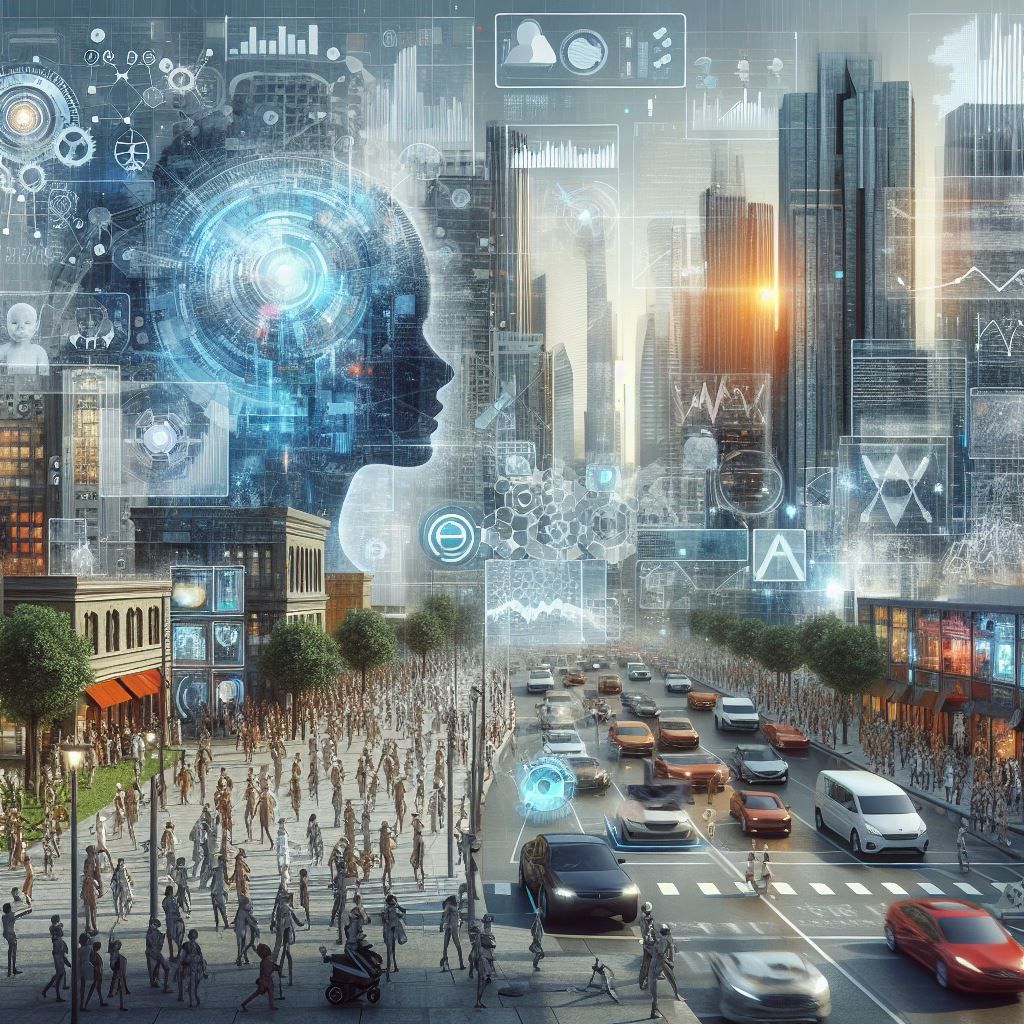Introduction
Content writing is a creative and versatile field that involves producing engaging and informative written content for various purposes and audiences. Content writers can work on blogs, websites, social media, newsletters, ebooks, and more, using their skills and knowledge to craft compelling stories and messages.
However, content writing is also a field that is undergoing rapid changes and challenges, as artificial intelligence (AI) technologies become more advanced and prevalent. AI tools and algorithms can now generate, translate, edit, and optimize written content, often with impressive results and speed. This raises the question: what is the future of content writing in the face of AIs?
The Current Landscape: AI in Content Writing
AI has already made significant inroads into content creation. Some of the key areas where AI is currently being used include:
Content Generation: AI-driven tools, like GPT-3 and its successors, have the ability to generate coherent and contextually relevant written content. These tools can create articles, blog posts, product descriptions, and more, often producing content that is indistinguishable from human-written text.
Language Translation: AI-powered translation tools can translate content between multiple languages with high accuracy, making it easier for content creators to reach global audiences.
Content Editing and Proofreading: AI-based grammar and style checkers, such as Grammarly, help writers improve the quality of their content by identifying and suggesting corrections for errors and inconsistencies.
SEO Optimization: AI tools help content creators optimize their content for search engines by analyzing keywords, providing suggestions for keyword placement, and suggesting ways to improve rankings.
The Pros and Cons of AI in Content Writing
AI has brought several benefits to the content writing process, but it also poses some challenges:
Pros:
Efficiency: AI can generate content at a much faster rate than humans, making it a valuable resource for content-heavy industries and meeting tight deadlines.
Consistency: AI can maintain a consistent tone and style throughout large volumes of content, ensuring brand coherence and messaging consistency.
Cost Savings: AI content generation tools can be cost-effective, reducing the need for hiring human writers for routine or repetitive tasks.
Multilingual Capabilities: AI can quickly and accurately translate content into multiple languages, allowing businesses to expand their global reach.
Cons:
Lack of Creativity: AI lacks the creativity, emotional intelligence, and originality that human writers bring to their work. It struggles with creating content that requires nuance, humor, or a unique voice.
Ethical and Legal Issues: AI-generated content may raise ethical and legal concerns, such as plagiarism, misinformation, bias, and data privacy. It may also be difficult to attribute authorship and accountability for AI-generated content.
Quality Control: AI-generated content may not always meet the standards and expectations of human readers. It may contain factual errors, logical flaws, or grammatical mistakes that human writers would avoid or correct.
Human-Machine Interaction: AI tools may not always understand the context, intent, and feedback of human writers and readers. They may also require human supervision and intervention to ensure optimal performance and output.
The Future of Content Writing: Human-AI Collaboration
The future of content writing is not a zero-sum game between humans and AIs. Rather, it is a collaborative and complementary relationship that leverages the strengths and weaknesses of both parties. Human writers can use AI tools to enhance their productivity, quality, and reach, while AI tools can benefit from human guidance, creativity, and evaluation.
Some of the possible scenarios for human-AI collaboration in content writing are:
Human-Aided AI: Human writers can provide inputs, such as prompts, keywords, or outlines, to AI tools to generate content. They can then review, edit, or refine the AI-generated content to ensure its accuracy, relevance, and appeal.
AI-Aided Human: AI tools can provide assistance, such as suggestions, feedback, or corrections, to human writers to improve their content. They can also perform tasks, such as research, translation, or optimization, that can save time and effort for human writers.
Human-AI Co-Creation: Human writers and AI tools can work together to create content, each contributing their own ideas, perspectives, and skills. They can also interact and communicate with each other to exchange information, opinions, and feedback.
Challenges Faced by Human Writers:
Yet, the integration of AI in content creation poses challenges for human writers. The fear of job displacement is a tangible concern as routine writing tasks become automated. However, the unique qualities of human creativity, emotional intelligence, and nuanced expression are irreplaceable, emphasizing the need for a harmonious coexistence between humans and machines.
The Symbiotic Relationship:
Rather than being adversaries, AI and human writers can forge a symbiotic relationship. AI can function as a powerful ally, aiding in research, content optimization, and even suggesting improvements in real-time. This collaboration allows human writers to harness the efficiency of AI while focusing on the aspects of content creation that require a distinctly human touch.
The Future Outlook:
Looking ahead, the future of content writing is marked by even greater collaboration between humans and AI. Augmented writing experiences, where AI provides real-time suggestions and enhancements, will become commonplace. Personalized content creation, driven by AI’s understanding of individual preferences, promises a more engaging and tailored reading experience.

Skills Needed for Content Writers in the Future
In the rapidly evolving landscape of content creation, content writers must proactively cultivate a diverse skillset to not only adapt to but also thrive in the era of AI. Here are some key skills that will be essential for content writers in the future:
Understanding AI Writing Tools:
Writers need to familiarize themselves with AI-powered writing tools and comprehend their capabilities. This involves gaining proficiency in tools that leverage natural language processing, machine learning, and automated content generation. A deep understanding of how these tools operate empowers writers to integrate AI seamlessly into their workflow.
Effective Collaboration with AI:
Collaboration with AI is not just about using the technology but leveraging it effectively. Content writers should develop the ability to work in tandem with AI tools, understanding when to let automation handle routine tasks and when to infuse a uniquely human touch. This collaborative mindset ensures that AI becomes an augmentation of human creativity rather than a replacement.
Strong Storytelling and Communication Skills:
While AI excels in data analysis and efficiency, the human touch is irreplaceable when it comes to storytelling and communication. Content writers must hone their storytelling skills to craft narratives that resonate emotionally with audiences. Effective communication, both in written and verbal forms, remains a critical skill, allowing writers to convey ideas with clarity and impact.
Staying Up-to-Date on Industry Trends:
The digital landscape is dynamic, with trends and algorithms constantly evolving. Content writers must stay abreast of the latest industry trends, technological advancements, and changes in consumer behavior. This ongoing commitment to learning ensures that writers can adapt their strategies and content to remain relevant and engaging.
Building Expertise in Niche Areas:
As content becomes increasingly specialized, writers should focus on building expertise in specific niche areas. This involves deepening their knowledge in particular industries, subjects, or markets. Specialization not only enhances the quality of content but also positions writers as authoritative voices in their chosen fields.
Conclusion
the future of content writing stands at the intersection of human ingenuity and artificial intelligence, offering a landscape rich with possibilities. Rather than viewing AI as a threat to the craft, we should embrace it as a powerful ally, capable of enhancing efficiency and expanding our creative horizons. The symbiotic relationship between human writers and AI technologies promises a fusion of precision and emotion, where data-driven insights coalesce with the artistry of storytelling.
As content creators navigate this dynamic landscape, the key lies in adaptation and collaboration. Writers must evolve their skillsets, understanding and leveraging AI tools while retaining their unique capacity for nuanced expression and emotional resonance. The future envisions augmented writing experiences, personalized content creation, and a continual evolution of strategies in response to emerging trends.
Ultimately, the coexistence of human writers and AI heralds a new era in content creation—one where the marriage of technology and creativity propels us towards uncharted territories. By embracing the transformative potential of AI and nurturing the quintessentially human aspects of storytelling, content writers are poised not only to meet the challenges of the future but to craft a narrative that reflects the best of both worlds. As the digital landscape continues to unfold, the fusion of human and artificial intelligence promises not only an evolution in content writing but a renaissance in the way we connect, communicate, and share our stories with the world.

